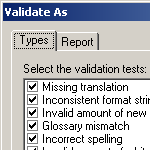MULTILIZER 6.0 Features
Multilizer Project
Multilizer Project is created when initializing a localization
project. The idea is to maintain the project along with the
software development; Multilizer takes care of synchronizing
localization project, if there are any changes in the software
to localize.
Multilizer stores all localizable data in platform and programming
tool independent XML-format. Localization is never done directly
on the software, so Multilizer is a safe solution. When localized
items are created, Multilizer reads the original software
and writes localized software based on the Multilizer project
information.
Visual Editors (Wysiwyg)
Multilizer Visual Editors allow editing of dialogs and other
resources visually; this allows user to see how localized
software will look like, thus it's called Wysiwyg (What you
see is what you get).
Visual Editors ensure that translations are always done in
correct context, as translator will see what other strings
are on the form/dialog being translated.
Multilizer is the first to introduce Wysiwyg for XML and
source files; when editing XML or any source file (.c, .pas,
.bas, etc.) user will see the code also. For XML and other
developers/localizers this drastically cuts down potential
sources for errors.
Smarter Translation Memory
Multilizer Translation Memory stores translations for later
re-use. Translations can either come from ongoing localization
project, or users can import translations as documents from
other formats and products, such as TMX-format or TRADOS for
example.
Multilizer Translation Memory enables automated translation
of Multilizer projects. Availability of Fuzzy match, close-to
match, and perfect match ensures that Multilizer takes advantage
of Translation Memory contents in the most efficient way.
In addition to imporvements in productivity users achieve
higher consistency in translations.
Opposed to other products, Multilizer Translation Memory
is installed on industry standard database. Installing it
on SQL Server, Oracle, or other RDBMS, enables multiple users
to use the same Translation Memory concurrently. This further
improves productivity.
Users can install as many Translation Memory databases as
desired. Any configured Translation Memory can include as
many imported documents as needed.
 Automated
Validation Automated
Validation
Almost 20 validation routines ensure that most common issues
are detected automatically. This cuts down considerably the
time and resources spent on quality assurance of localization
project.
Validation links enable easy navigation between validation
result window and the correct location in project. This speeds
up working in correcting issues.
Validation reports are produced in XML-format, which enables
easy integration of validation data in enterprise's own systems.
Statistics
Multilizer shows real-time status information in the main
window. This keeps users updated of the very basic information
of target language status, and current string being edited.
Comprehensive statistic reports show in word/string counts
and percentages the current status of project. This information
helps to plan resource use in ongoing localization project,
and it's useful for translation cost estimation.
Statistic reports are produced in XML-format, which enables
easy integration of project statistics data in enterprise's
own systems.
Support for any language
Multilizer supports both Unicode and ANSI, which ensures
best possible language compatibility on any supported platform.
Pseudo language tests are available for Western, Middle Eastern,
and Far Eastern character sets.
Besides support for character set standards, Multilizer supports
localization of IME properites of .NET and Delphi/C++Builder
software; this improves the quality of software localized
to Far Eastern languages, such as Japanese and Chinese.
Comparison of supported platforms
| Supported
Platforms and Development Tools |
 |
 |
 |
 |
 |
 |
 |
| Microsoft Win32 Applications (EXE, DLL, OCX, etc.) |
 |
 |
|
 |
|
|
|
| Microsoft .NET Application resources (ResX) |
 |
 |
|
|
 |
|
|
| Visual Studio .NET project files (sln, csproj, vbproj,
etc.) |
 |
 |
|
|
 |
|
|
| Visual Studio .NET Smart Device Application projects |
 |
 |
|
|
 |
|
|
| Borland C#Builder project |
 |
 |
|
|
 |
|
|
| Borland Delphi 8 project |
 |
 |
|
|
 |
|
|
| Borland Delphi/C++Builder binaries (EXE, DLL, OCX, etc.) |
 |
 |
 |
|
|
|
|
| Java (J2EE, J2SE) |
 |
|
|
|
|
 |
|
| J2ME |
 |
 |
|
|
|
 |
 |
| Database contents (Oracle, SQL Server, DB/2, etc.) |
 |
 |
|
|
|
|
|
| Oracle Forms and Reports applications |
 |
|
|
|
|
|
|
| XML and derivatives |
included
in all Multilizer products |
| Text files (UTF-8, UTF16, ANSI, etc.) |
| INI-files, KEY-files |
| SHL-files |
|
